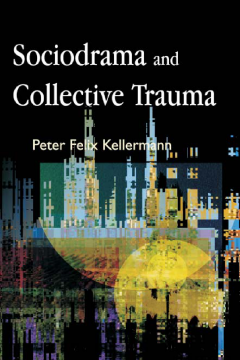
Additional Information
Book Details
Abstract
Time does not heal all wounds: decades after a disaster, entire communities may still experience the long-term effects of trauma.
Sociodrama and Collective Trauma examines the psychological and social damage of trauma to society as a whole. Kellermann argues that collective trauma has been insufficiently considered; his timely book suggests practical ways of facilitating the rehabilitation of survivors of collective trauma through, for example, sociodrama and related group work. The author develops methods for understanding the past and preparing for the future and provides a wealth of case studies based on 30 years' experience of treating survivors of war trauma and other forms of disaster.
Combining a systematic theoretical approach with a practical methodology, this insightful book is invaluable for drama therapists, group therapists, mental health professionals and counsellors.
The text provides an inspiring essay on the possible use of sociodrama as a means for ameliorating collective drama and for reconciliation. It is a rich and committed book, conveying the deeply felt responsibility of the author to confront prejudices, inhumanity and ideologies promoting violations of human rights and human dignity.
Counselling and Psychotherapy Research
Sociodrama has an important role to play in bringing creativity and spontaneity back to all the citizens of our much threatened globe.
Zerka Moreno
This is a very compassionate text about human suffering.
Groupwork
Peter Felix Kellermann, PhD is a clinical psychologist and an international trainer of psychodrama and sociodrama. From 2001-2004 he was the executive director of AMCHA - a treatment centre for Holocaust survivors and their families in Israel. Kellermann is the author of Focus on Psychodrama and co-editor of Psychodrama with Trauma Survivors, both published by Jessica Kingsley Publishers. He lives with his family in Israel.
The central "meat" of the book explains the differences between sociodrama and psychodrama and the different potential applications of the former. This book should interest any therapist working or training to work with refugees, asylum seekers or casualties of violence and abuse.
Therapy Today
Kellerman argues that collective trauma has been insufficiently considered. He suggests practical ways of facilitating the rehabilitation of survivors of collective trauma and develops methods understanding the past and preparing for the future. He provides a wealth of case studies based on 30 years' experience of treating survivors of war trauma and other forms of disaster.
The Bulletin of the British Psychodrama Association
Table of Contents
| Section Title | Page | Action | Price |
|---|---|---|---|
| 1 Introduction to wellbeing ranking: developments in applied community-level poverty research | |||
| 2 How wealth ranking was developed | |||
| 3 The history of wellbeing ranking techniques | |||
| 4 Some practical examples and what users say about wellbeing ranking | |||
| 5 Methodological issues in wellbeing ranking | |||
| 6 Using participatory wealth ranking in a South African microfinance organization: the value of scale | |||
| 7 Wellbeing ranking, semi-structured interviews and practitioner bias: personality traits and participatory narratives | |||
| 8 Wellbeing assessment in practice: lessons from wellbeing and poverty pathways | |||
| 9 Wealth ranking to wellbeing: Where next for development? | |||
| 10 Conclusions about wellbeing assessments and ideas for the future | |||
| Annexes | |||
| 1. How to do wellbeing ranking | |||
| 2. How to do wellbeing groups | |||
| Index |
